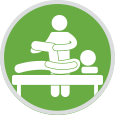When we start working with our clients, our number one goal is to get people back to health, making them fitter and with improved wellbeing and productivity. Once we have established an efficient system of getting people back to work we can then move to the next stage, which is keeping people fit and healthy so they remain at work.

We offer 2 types of triage:
1. Standard Triage
2. Biopyschosocial Triage
Physio Med have a standard triage to ensure the appropriateness and safety of an individual, this is done by using Contractual and Red Flag Questions.
At this point we can determine patient’s qualification to take up the service using Qualifying Contractual Questions. These questions are agreed with the client organisation in advance to make sure the individual fits within the organisation referral criteria.
Red Flag Questions are used to indicate signs or symptoms of the presence of any serious pathology and helps to ensure correct safe clinical routing i.e. into the physiotherapy pathway or back to the G.P. for further investigation.
It is this information that directs the clinical routing decision for onward case progression.
This is a multidisciplinary approach to triage that includes exploration of relevant biological, psychological, social, cultural, and environmental variables for the purpose of evaluating how such variables may have contributed to the development and maintenance of a presenting problem.
It would cover 3 areas:
This approach gives the Triage team indicators of the individuals biological, psychological and social factors, which play a significant part in human function we can ensure best clinical routing and advise what other interventions would be suitable which may include Cognitive Behaviour Therapy (CBT) .
Again this information is critical in making clinical routing decisions for onward case progression and the appropriate intervention.
This information helps make a clinical routing decision for onward case progression to the appropriate intervention of which we have three:
The referred employee is contacted within four hours by the dedicated Relationship Manager and the call normally takes approximately 15 minutes using evidence-based clinical decision making and supporting evidence-based tools.

Through the utilisation of a subjective, objective and clinical assessment, our experienced Occupational Physiotherapists will liaise with all involved parties such as the patient, employer and general practitioner to:
The Initial Assessment is a structured assessment by a Chartered Physiotherapist that takes between 30 minutes and 1 hour dependent on complexity.
This will consist of:
Feedback is provided in regard to their injury and associated dysfunction both in and out of the workplace with clear strategies and goals documented. Provision of further treatment or assessment recommendations to assist the injured employee to improve their functional ability and work related capacity.
An initial assessment report is generated and sent to the client within 2 working days of the appointment, with the content of the report in-line with Client requirements.

The aim of physiotherapy treatment is to help restore movement and normal body function in cases of illness, injury and disability.
As well as treating a specific problem, the physiotherapist may also suggest ways you can improve your general wellbeing – for example, by taking regular exercise and maintaining a healthy weight for your height and build.
Physiotherapists take a focused approach to the problem whilst also using a biopyschosocial and holistic approach, looking at the body as a whole treating all of the factors of an injury or illness.
The physiotherapist will look at the individual situation. As well as treating the problem, they may also suggest things the patient can do on a daily basis to help relieve pain and discomfort.
Our Physiotherapists use a wide range of treatment techniques and approaches including the latest 'cutting edge treatments'.
Some of these are described below:

The purpose of the Interim Assessment is to analyse how the patient is progressing with treatment, evaluate current condition against original goals, understand how further treatment will benefit the patient and what business benefits there are to justify further funding.
This will be produced once the patient has received the agreed amount of treatment at Initial Assessment stage, however the practitioner feels further treatment or other intervention is required.
Physio Meds Clinical panel scrutinise all Interim Assessment and will take the following actions:
The aim of the Interim assessment is to determine:
This process is undertaken and dispatched with a full recommendation to the client within 2 working days.

The purpose of the Clinical Review is to assess the patient’s condition following treatment, understand what recovery they have made, determine their correct next routing, update their Rehabilitation Programme if required and encourage the patient to continue self-managing.
For the significant majority of patients this will be a full discharge from the service as they have recovered sufficiently, or will achieve full recovery with continued adherence to their progressive Rehabilitation Programme.
A Discharge report is generated and sent to the client within 2 working days of the review, with the content of the report in-line with Client requirements.
Throughout our Occupational Physiotherapy Service we aim for the following outcomes: